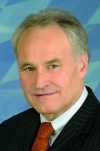We proudly announce six keynote speeches at IM 2007. The keynotes will be performed Tuesday at 9:00h and Wednesday and Thursday at 8:45h.
- Tuesday, 22 May 2007
- Keynote 1: Erwin Huber (Bavarian State Minister)
- Keynote 2: Ulrich Pfeiffer (HP)
- Keynote 1: Erwin Huber (Bavarian State Minister)
- Wednesday, 23 May 2007
- Keynote 3: Prof. Dr. Wolfgang Gentzsch (D-Grid)
- Keynote 4: Prof. Vasilis Maglaris, Ph.D. (GÉANT2)
- Keynote 3: Prof. Dr. Wolfgang Gentzsch (D-Grid)
- Thursday, 24 May 2007
- Keynote 5: Keith C. Goodman (IBM)
- Keynote 6: Dr. René Wies (BMW)
- Keynote 5: Keith C. Goodman (IBM)

Bavarian Minister of Economic Affairs, Infrastructure, Transport and Technology
Erwin Huber was appointed State Minister and Head of the Bavarian State Chancellery in 1994. He held the office of Bavarian State Minister of Finance from November 1995 to October 1998. From 1998 until 2003 he was State Minister and Head of the Bavarian State Chancellery. In 2003 he became Head of the Bavarian State Chancellery and State Minister for Federal Affairs and Administrative Reform. He has been Bavarian State Minister of Economic Affairs, Infrastructure, Transport and Technology since November 2005.
Keynote: Bavaria: Region of first choice for economics and science
Bavaria is proud to host IM 2007, the 10th international IFIP/IEEE conference for IT management. This top-class conference with excellent reputation worldwide now takes place outside of the United States only for the second time. The Free State of Bavaria as a leading region for business and science is honoured to offer a prime setting for all conference attendees to have fruitful discussions. As a leading place in information technology, Bavaria is not only the home of renowned companies but also of distinguished universities and research centers. Bavaria provides this innovative sector an ideal environment.
Regional CTO, Software Global Business Unit, HP
Ulrich Pfeiffer joined HP in 1988 starting as an Application Engineer at the Consulting and Integration organization in Germany. 1994 he became part of the Software Global Business Unit as product manager for HP OpenView Operations. He then actively developed the HP Software pre sales community in Europe, Middle East and Africa (EMEA) and took over the responsibility to manage the HP OpenView Competence Center providing pre-sales services. As a Regional CTO for HP Software Ulrich today works with HP corporate accounts to help develop their Adaptive Enterprise Management strategy and influences the HP Software engineering plans and roadmaps.
Keynote: From Network to Service Management - How to Optimize Your Business Outcome
Picking up the theme of this year's conference Ulrich will take you on an evolutionary journey how IT can move from managing the bits to delivering real business value. The key challenges and technologies used along the way will be described and are accompanied by customer examples and a live demonstration. Starting from network management over to service driven operations, IT service management including CMDB techniques up to business service management. Of course the relevance of ITIL v2 is included, as well as the soon to be published version 3. Towards the end Ulrich will briefly outline how HP's Business Technology Optimization (BTO) solutions can be used to cope with the challenges introduced earlier. BTO management software and services help you understand the impact of technology on your business outcomes and help to make your most important strategic initiatives succeed.

Coordinator of the German D-Grid Initiative
Dr. Wolfgang Gentzsch is head of the German D-Grid Initiative. Before, he was managing director at MCNC Grid Computing and Networking Services and lead the North Carolina Grid initiative, and he was Sun's senior director of grid computing. He is member of the standards Open Grid Forum Steering Committee, responsible for coordinating the major grid projects around the world. He is Co-Chair of the CEC e-Infrastructure Reflection Group (e-IRG) which targets at building one e-Science infrastructure for all Europe. He is adjunct professor of computer science at Duke University in Durham and at the University Charlotte, and visiting scientist at the Renaissance Computing Institute of the University of Chapel Hill. He also serves on US President's Council of Advisors on Science and Technology (PCAST).
Keynote: Grid Computing: Extreme Makeover - from Early Steps to Community Adoption
Rebuilding our distributed computing and data infrastructures - Grid edition
Over the past decade, due to the promising potential of the client-server paradigm, our IT infrastructures have grown along with our changing research and business needs, with often ad-hoc add-ons and fixes, as globalization proceeded to flatten the world. Today, many businesses and research communities face the need to restructure and align their existing IT infrastructures to achieve the flexibility and efficiency needed to compete in a rapidly changing world.
During the same time, the grid computing paradigm has evolved, providing 'piping' technology and tools to virtualize the whole IT stack, from the network and hardware resources up to the application and services layer. Still, our experts in multiple locations work on different building blocks, like the Open Grid Services Architecture (OGSA), the Service Oriented Architecture (SOA), or the Web Oriented Architecture (WOA), within local or global settings. Just because we are using different names must not mean that they are so different. Therefore, one aim of our presentation should be to analyze the differences and commonalities of these architectures, and demonstrate their strengths with the aid of practical use cases. This presentation has a slight grid-bias, in concert with the perspective and experience of the speaker.

Chairman of the GÉANT2 National Research and Education Networks Policy Committee, NTUA Athens
Vasilis Maglaris is a Professor of Electrical & Computer Engineering at the National Technical University of Athens (NTUA) since 1989. He holds an Engineering Degree from NTUA (Athens, Greece, 1974) and a Ph.D. degree from Columbia University (New York, USA, 1979). Before joining the faculty at NTUA, he held industrial and academic positions in the USA for ten years, all in advanced electronic communications. Apart from teaching and performing research on Computer Networks, he was responsible for developing the NTUA Campus LAN and for the establishment of GRNET (the Greek National Research & Education Network - NREN). He served as GRNET's Chairman from its inception (1995) until June 2004. From 1994 to 1996, he was the Executive Director of the National Hellenic Research Foundation (NHRF). He also served on the board of the Greek National Regulatory Authority on Telecommunications and Posts for two five-year terms (1995 - 2005). Since October 2004, he serves as the Chairman of the National Research & Education Networks Policy Committee (NREN PC). The NREN PC harmonizes policies amongst the 31 NRENs in the extended European Research Area; it is also responsible for the Pan-European advanced network platform GEANT. He is currently directing the Network Management & Optimal Design (NETMODE) Laboratory within the School of Electrical & Computer Engineering at NTUA. He authored more than 100 research papers and regularly delivers lectures on Internet advances.Keynote: Multi-Domain Management: Results Achieved and Future Challenges Using the Example of GÉANT
Multi-domain management has been an open issue throughout the evolution of electronic communication networks, not necessarily due to technical but also to political, organisational or business aspects. Judged from the user perspective interoperability is required at the data plane, the control plane and also at the provisioning plane. It is interesting to note that there have been only two success stories in multi-domain control plane interoperability: SS7 for telephony and BGP for the Internet. The latter is by large responsible for the booming of the global Internet as it resolves routing across multiple Autonomous Systems.
The complexity behind multi-domain service provisioning becomes more evident in cases where different technologies need to interwork at the data plane, different protocols appear at the control plane and different resource allocation policies and AAI mechanisms are used at the business layer. It is a delicate issue for a domain administrator to allow provisioning by a third party, be it an end-user or another domain's administrator. The GÉANT community of 31 European National Research & Education Networks (NREN's) is investigating the issues emerging from multi-domain monitoring and bandwidth-on-demand services in a diverse environment. A key element to support the development and operation of multi-domain services and applications is the definition and development of a common Network Information Service that incorporates some multi-domain abstractions on top of domain specific objects.End-to-end monitoring is a prerequisite to multi-domain operations and especially the willingness of network administrators across an end-to-end path to share domain state information. The GÉANT Consortium has established a community of trust allowing for the development and deployment of active and passive measurement tools in all participating domains. The participation in this effort of our US colleagues from Internet2 and ESNet was instrumental for extending our global outreach.
In the past, bandwidth-on-demand VPN services were performed for IP or MPLS based domains. Recently, we gained considerable experience from the establishment of Optical Private Networks, implemented by combining DWDM services offered by NREN's and GÉANT2 to power end-users (e.g. large super computing and/or Grid facilities). The Consortium is currently reaching the latest phase in developing pilot monitoring and automated provisioning tools, which will enable end-to-end management across heterogeneous data and control plane domains in hybrid (i.e. Packet-IP and Circuit Switched) optical networks.
Apart from providing tools to network operators and demanding end-users in a multi-domain hybrid environment, our prototyping activities aim at further investigating a number of technical issues. These include interoperability of domain management systems (policies, architecture, protocols - web services, topology inference, information schemata) and algorithms for multi-domain reservations based on incomplete mutual information (path discovery, near real-time and quasi-static scheduling, QoS and

IBM Distinguished Engineer and CTO for IT Strategy and Architecture Services
KC Goodman is an IBM Distinguished Engineer and CTO for IT Strategy and Architecture Services in IBM Global Technology Services (GTS). He is responsible for the technical strategy and content in IT consulting and design service products, including IT service management. He is a member of several architecture boards and is active in a number of Communities of Practice. He is also an experienced IT management consultant with over 30 years experience helping clients plan, design, and build IT management solutions.Keynote: From Systems Management to Service Management: Enhancing the Business Value of IT Services
Best practices in IT service delivery have evolved from a focus on resource management, past systems management to the new era of service management. Leading IT organizations are implementing a services oriented framework that shifts the focus from a reactive to a proactive model that delivers high value services aligned to business needs. This presentation will discuss several best practices and case studies for this evolution in service delivery management.

BMW Group, Vice President, Head of IT for BMW's Engineering and Purchasing Division
Dr. René Wies, born in 1967, grew up in Germany and Zimbabwe. He studied Computer Science in Munich (TU Munich) and later Business Administration in Japan and USA (Boston Univ.). During his time at the Munich Network Management Team (MNM Team) he received a Ph.D. for his research in policy-based network and systems management. After three years in the consulting business, he joined BMW in 1997. Following a number of international assignments in the IT and in corporate strategy, he became head of IT for BMW's Engineering and Purchasing Division.
Keynote: Integrated Systems Management - Can it be applied to Automotive Development
Approx. 20 years ago, researchers at McDonalds submitted a number of papers to ISNM (later IM), drawing the attention of reviewers to the need for network and systems management in some very practical cases. It was amazing how policy-based IT management was applied to the hamburger industry. With its world wide presence, McDonalds needs to run what is probably one of the most distributed and heterogeneous IT environments, and has to meet some breathtaking requirements regarding the IT service delivery. However, the complexity of these requirements arises from the purchasing and logistics processes - not the final product.
In the automotive industry, the product "car" is becoming an increasingly complex IT system in itself: In a modern car we find several heterogeneous networks i.e. buses, connecting up to 100 different software-based control units and various other systems. The requirements being faced in their management are not limited to general performance and reliability questions, but also need to take into account information security and privacy concerns (for infotainment solutions) as well as critical car safety issues.
Adding yet further to this complexity: the car is no longer autonomous! It is becoming integrated in an IT infrastructure with a multitude of heterogeneous communication partners (e.g. in car-to-car and car-to-environment communication), services (e.g. toll collect systems, traffic control and information systems) and management domains (e.g. legal, organizational, technical domains).
The keynote will discuss similarities and differences regarding systems management techniques and challenges between "traditional" IT infrastructure and service environments and the automotive environment.




